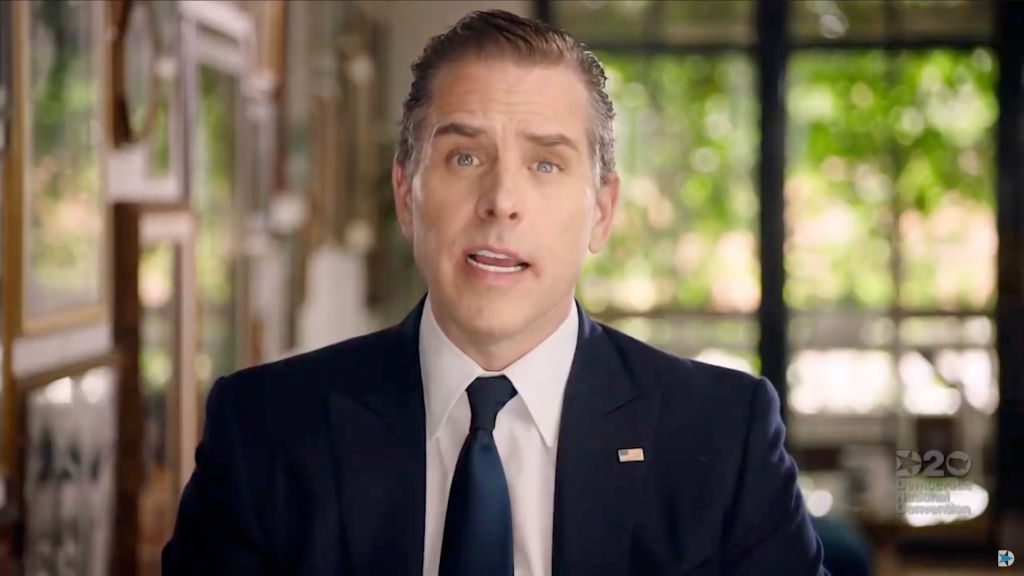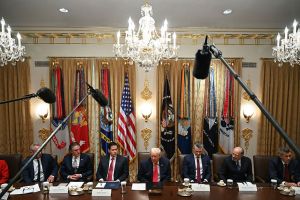Hunter Biden will appear at a Wilmington court on Wednesday to plead guilty to two misdemeanor counts of failing to pay taxes. These charges are the result of the prolonged investigation that has been the subject of serious claims of political interference from two IRS whistleblowers. Along with a pretrial agreement relating to a felony gun charge, the misdemeanors make up what many in Washington see to be a sweetheart deal for the president’s son.
Assuming Hunter’s lawyer can concentrate between bong rips, and Hunter himself manages to tear himself away from Nobu Malibu and make it to court on time, it should be a fairly routine appearance.
The bigger headache for the first son — and the president — comes courtesy of former Hunter business associate Devon Archer, who is set to testify before the House Oversight Committee this week. The New York Post reports that Archer will say, under oath, that Hunter dialed his father in to calls with overseas business partners, including executives at Burisma, the Ukrainian energy company that employed Hunter as a director.
“We are looking forward very much to hearing from Devon Archer about all the times he has witnessed Joe Biden meeting with Hunter Biden’s overseas business partners when he was vice president, including on speakerphone,” committee chairman James Comer told the Post.
The testimony will only be the latest in what is fast becoming a deluge of allegations and evidence about the president’s son’s business affairs, the president’s involvement in those dealings, and the Justice Department’s handling of multiple investigations into Hunter. Last week brought compelling and credible testimony from two IRS whistleblowers, as well as the release by Senator Chuck Grassley of an FBI document detailing an unverified allegation by a foreign informant that Joe and Hunter Biden accepted bribes from Burisma.
For now, it is the IRS whistleblowers who deserve the most attention. Gary Shapley and Joseph Ziegler don’t seem to be partisan plants, but dedicated civil servants alarmed at the improper interference they witnessed into Hunter Biden’s case. Which brings us back to the first son’s appearance in a Delaware courtroom this Wednesday. Shapley and Ziegler said before Congress last week that they decided to go public after David Weiss, the US attorney handling the case, told them privately that it was not up to him to decide whether to charge Hunter outside of Delaware. (The more serious charges would have to have been brought in Washington, DC and California.)
Shapley and Ziegler’s account of evidence has received an unconvincing rebuttal from Weiss and Attorney General Merrick Garland — who has serious questions to answer. Meanwhile, this already unflattering picture painted of the president and his son is not going to look any better after Archer’s testimony this week.
The White House can still count on a fairly pliant press; the whistleblowers’ testimony got nowhere near as much attention as it deserved last week. But that may not matter. House investigators certainly won’t be fazed, and the steady stream of evidence is starting to speak for itself.
On our radar
SHE’S RUNNING Former US senator Kelly Ayotte has announced her bid for New Hampshire governor. Ayotte, a Republican, was sent packing in a tight Senate race in 2016. Her gubernatorial bid comes after moderate Republican incumbent and frequent Trump critic Chris Sununu said last week that he would not seek reelection.
GERONTOCRACY UPDATE NBC reports on the steps taken by Biden’s team to avoid public displays of frailty from a candidate most Americans think is too old for the job. Among them: eschewing the long staircase up to the main entrance to Air Force One (the commander-in-chief’s ascent of which NBC calls “an iconic image of the modern presidency”). Instead, Biden is more likely to opt for a shorter set of steps into the plane’s underbelly.
Can China be trusted to help fight fentanyl?
The Wall Street Journal reports that the Biden administration is contemplating a possible agreement with China in an effort to cut off the precursor chemicals used in fentanyl production in Mexico. China has refused to work with the US due to sanctions that the US has on the Institute of Forensic Science, which has been connected to human rights violations in Beijing’s ongoing genocide against the Uighurs. The Journal quotes State Department spokesman Matthew Miller as saying, regarding secretary of state Antony Blinken’s visit to China, that “No member of the US delegation [to China] offered to lift any sanctions on PRC entities or said we would consider doing so.”
Nonetheless, the Journal says that the administration is, apparently, contemplating the deal. Getting China to cut the supply of raw materials to cartels in Mexico is as basic a responsibility as it gets, and if Beijing is unwilling to do it, then more pressure — not leniency — is called for. Xi Jinping will play hardball as long as he sees that Biden is more likely to back down than push back harder.
China, of course, is also notorious for ignoring or outright flouting agreements — see Hong Kong — and it will do the same with this one, not least because the administration will bend over backwards to keep a deal de jure in place, even if Beijing throws it in the paper shredder.
Cooperation for show alone is appeasement in practice, and for the White House to even contemplate dropping its sanctions on an organ of Beijing’s campaign of genocide encapsulates exactly why this problem exists in the first place: Xi knows he can extract some benefit at very little cost.
-John Pietro
Musk’s X games
It will trash the brand. It will alienate its core users. And relaunching and rebranding a failing business almost never works. As Elon Musk drops the Twitter blue bird and swaps it for an X, we will hear plenty of arguments about why the world’s second richest man has made another critical commercial mistake. In fairness, some of them have a point. Yet Musk’s critics are making a mistake by missing the real purpose of the new name. X only exists to kill off Twitter.
The rebrand was announced in a typically haphazard way. As of today, Twitter will be known simply as X. It was Musk’s boldest move yet since his $44 billion takeover of the social media site, and one that went down about as well as his other changes to the company since taking it over.
Twitter’s always-irritable users were out in force, condemning the move as irresponsible, wrong-headed and risky. No doubt Mark Zuckerberg, the founder of Meta, was quietly chuckling over the boost it would give to his newly-launched rival Threads.
True, Musk may have made a mistake. Twitter, for all its flaws, is a well-known brand. It has name recognition and a couple of hundred million loyal users. It has plenty of advertisers left, even if not quite as many as before. The rebranding may well go down as a catastrophic error. Here is the twist, however. It is possible that Musk is actually a lot smarter than his many critics. The real reason for the rebrand is that he has worked out that Twitter will never be profitable. Twitter has made a loss in eight of the ten years from 2012 to 2021 and hasn’t turned a profit since 2019. It doesn’t deliver the precisely-targeted advertising that you need to make money on the web; you can’t sell over it, and when you try to charge for it, everyone immediately leaves. It has one of the worst business models ever created.
In reality, the point of X, which Musk has discussed extensively, is to create a rival to China’s fabulously successful WeChat. That app is used for chatting to friends, and, of course, for sending kitten emojis by the tens of millions, but it also does a lot more than that.
WeChat is used for payments, for ID, for finance, for travel and for shopping. If there is one real space in the West’s digital economy, it is for an app that matches it. With Twitter rebranded as X, Musk has the chance to create that. He has the user base and the technology. True, it might well be crazily ambitious, the regulators might never allow it, and the competition might be too fierce. But it is a huge prize, and it makes a lot more sense than running a perpetually money-losing social media site for self-important virtue-signaling. Musk has launched X to kill Twitter — and who knows? He might even succeed.
–Matthew Lynn
From the site
Daniel McCarthy: The once and future president?
Birdie Hall: The case against surrogacy
Ben Domenech: Is Ron DeSantis the new Kamala Harris?
Poll watch
PRESIDENT BIDEN JOB APPROVAL
Approve 41.7% | Disapprove 53.7% | Net Approval -12.0
(RCP average)
IOWA REPUBLICAN PRESIDENTIAL CAUCUS
Trump 46% | DeSantis 16% | Scott 11% | Ramaswamy 6% | Haley 5% | Pence 4%
(Fox Business)
Best of the rest
Joe Manchin, USA Today: Extremist Dems and Republicans threaten America’s future
Aatish Bhatia, Claire Cain Miller and Josh Katz, New York Times: Study of elite college admissions data suggests being very rich is its own qualification
Tina Nguyen, Puck: The DeSantis surveillance state, revisited
Byron York, Washington Examiner: Chris Christie brings a whole lotta Jersey to South Carolina
Josh Kraushaar, Axios: McCarthy’s winning streak
Holly Otterbein and Zack Colman, Politico: Joe Biden faces looming strikes that could rock economy
Sign up to receive the DC Diary in your inbox on Mondays, Wednesdays and Fridays here.

























